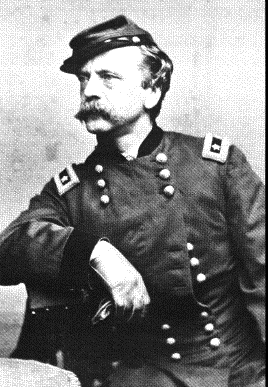Dan Sickles and the Temporary Insanity Defense

The Civil War spawned a number of so-called “political generals” for both the Union and the Confederacy. In most cases, these were well-connected men that had little or no military experience but had the means to help raise and equip regiments and therefore ended up with officers’ commissions. Some of them performed their duties surprisingly well; others were unmitigated disasters as commanders of regiments, brigades, divisions, or entire army corps. Few political generals, however, came to the war with as much notoriety as Daniel Edgar Sickles.
In 1859, just two years before the war started, Sickles was a Democrat representing New York’s Third Congressional District in the U.S. House of Representatives. He was a well-known ladies man; his wife, Theresa, was just fifteen years old and pregnant when he married her in 1852 (when Sickles was thirty-three, by the way). Philip Barton Key II was the U.S. Attorney for the District and Columbia and a friend of Congressman Sickles. He was also the son of Francis Scott Key, author of The Star-Spangled Banner. Sickles made the mistake of asking his friend Key to escort Theresa to social events the Congressman could not attend, and the friendship between Key and Mrs. Sickles soon turned romantic. Someone sent Dan Sickles an anonymous letter telling him of his wife’s infidelity, and when confronted she confessed. She told her husband that Key would stand in Lafayette Square and wave a handkerchief at the Sickles home to signal Theresa to meet him.
On February 27, 1859, Sickles looked out his window and saw Key waving his handkerchief. Enraged, the Congressman stormed outside shouting, “Key, you scoundrel, you have dishonored my home. You must die!” Sickles pulled a pistol and shot Key several times. When the wounded man pleaded for his life, Sickles drew a second pistol and shot him in the chest. He then fled to a friend’s home, where he surrendered to police a few hours later. (The friend, by the way, was Jeremiah Black, Attorney General of the United States.)
Sickles was charged with murder and taken to jail to await trial. During his detention, he received visits from numerous Congressional colleagues and government officials; President James Buchanan sent a supportive personal letter. Public sentiment was strongly in his favor as well, especially after details of his wife’s confession became known. Sickles was portrayed as a wronged, grieving husband who had only sought to restore his honorable name. As his trial approached, his legal team-which included future Secretary of War Edwin M. Stanton-proposed a defense never before tried in the United States: not guilty due to temporary insanity.
This defense had first come about in a British case in 1843 when Daniel M’Naghten, clearly mentally disturbed, had tried to assassinate Prime Minister Robert Peel but killed Peel’s secretary instead. M’Naghten was found not guilty at trial because of his mental illness. Following public outrage, a House of Lords panel of judges made a series of recommendations that became known as the M’Naghten Rules. They stated that a defendant can use an insanity defense if “at the time of the commission of the acts…the defendant, as a result of a severe mental disease or defect, was unable to appreciate the nature and quality of the wrongfulness of his acts.” In other words, could the defendant differentiate between right and wrong?
At trial, Edwin Stanton argued that learning of Theresa’s affair drove Congressman Sickles temporarily insane and that he was not in his right mind when he shot Key. Therefore, Sickles could not be held liable for his actions. Newspaper accounts provided graphic details of Mrs. Sickles’ affair with Key, which likely came from a detailed confession her husband forced her to write. These articles often applauded Sickles for his actions, and the jury quickly acquitted him of murder. After being released from jail, Sickles immediately destroyed public goodwill by forgiving his wife and returning to her. His reputation ruined and his prospects for reelection to Congress dim, he returned to New York in disgrace. He and Theresa remained married until she died of tuberculosis in 1867.
Fate soon intervened to bring Sickles greater fame than he acquired by shooting Key. The Civil War began in 1861, and Sickles obtained a Union army commission. By the July 1863 battle of Gettysburg, he was a Major General commanding the Army of the Potomac’s Third Corps. After violating his orders and moving his entire corps forward on the battle’s second day, General Sickles was wounded by an artillery shell and had his right leg amputated. He promptly sent the leg to Washington, where he supposedly visited it every July 2 for years to come. He also argued for the rest of his life that his unauthorized movement saved the Union army at Gettysburg, and he was awarded the Medal of Honor on October 30, 1897. He was a staunch advocate for the preservation of the Gettysburg battlefield. Sickles died at age ninety-four on May 3, 1914, and is interred in Arlington National Cemetery.
Today, many more people know about Dan Sickles for his role at Gettysburg than his dubious distinction as the first American to dodge a murder conviction due to temporary insanity. Though the temporary insanity defense is rarely attempted and even more rarely successful, it is certainly worth noting when its first use here in the United States. Though Sickles likely would have preferred to be remembered for his military exploits, just knowing that we’re still talking about him at all would probably make him very happy indeed.
Jim Hessler’s “Sickles at Gettysburg…”
Is a good read on the man and gives his whole life story. Sickles is an interesting character.
Not only interesting but one who always traveled along the hazy margins of honesty and ethical conduct. Did they ever find the missing funds from the NYMC?